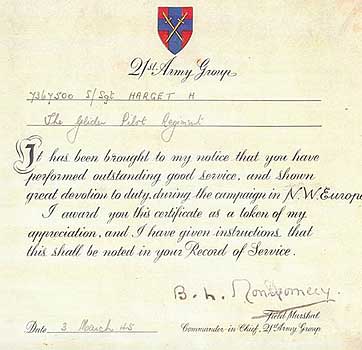Name: Bert Harget
Rank: Staff Sergeant/1st Pilot
Unit: E Squadron
Regiment: The Glider Pilot Regiment
I flew over to Arnhem from Down Ampney on the second day as 1st Pilot of a Horsa glider towed by a Dakota. As we had heard that the previous day's landings had been successful we were in confident mood.
I remember passing over the cost near Walcheren Island, which was flooded with only the odd house sticking up through the water. After releasing from my tug, I flew over the southern edge of Deelen Aerodrome without a shot being fired at my glider and landed safely on Landing Zone "S", the most northerly of the L.Z.'s. I recall walking right across the open heath land (hearing the sound of gun fire in the distance) but it was not until we reached the railway crossing near Wolfheze that we encountered the first enemy activity. Someone was firing up the railway line. Safely negotiating this action we reached our rendezvous point where we were dispersed to form a defensive line around the village and for the next two days we were continually digging in, then moving to a new position and then digging in again.
On the fourth day I had a trench on the edge of a wood facing the German position about 250 metres away. I was told that I was wanted at Divisional Headquarters at the Park Hotel (later renamed the Hartenstein Hotel) and I made my way there leaving my rucksack at the side of my trench. That was the last I saw of it, as when I returned later on I found that a German mortar bomb had landed on it and I had lost all my rations including several bars of chocolate that I had hoarded over the previous weeks.
 At Div. H.Q. I was asked to take a patrol to a forward area to try to locate the German
mortar positions. We found a suitable house for observation and were able to send back
messages indicating where the mortars were. The next morning we were all standing outside
therear of the house in a small courtyard, discussing the move back to Div. H.Q. when a
mortar bomb came over the roof of the house and exploded right amongst us. Of the eight
men who were there I was the only on not hit by shrapnel. I managed to get stretcher
bearers to the others and helped carry one of my Glider Pilot colleagues to a dressing
station.
At Div. H.Q. I was asked to take a patrol to a forward area to try to locate the German
mortar positions. We found a suitable house for observation and were able to send back
messages indicating where the mortars were. The next morning we were all standing outside
therear of the house in a small courtyard, discussing the move back to Div. H.Q. when a
mortar bomb came over the roof of the house and exploded right amongst us. Of the eight
men who were there I was the only on not hit by shrapnel. I managed to get stretcher
bearers to the others and helped carry one of my Glider Pilot colleagues to a dressing
station.
Then for the next few days it was back to the perimeter defence, moving back continuously and digging in. I had no food of my own, only what I could scrounge from the houses. Then, on what turned out to be the last day of the battle, came the news that we were to retreat across the river that night. Later that day I went to the dressing station to see the Glider Pilot whom I had carried in there some days before. While there I was asked to help take the walking wounded to the river, as the medical staff were staying behind.
It was a terrible night, pouring with rain and pitch black when we set off in a line, a fit man at the front and myself bringing up the rear. We all held onto the smock of the man in front. At one point we passed within a few metres of a German position - we could hear them talking - but the heavy rain deadened any noise we made and we were not seen. After about 15 minutes I slipped on a muddy bank, lost my grip on the man in front and by the time I had regained my feet the column had disappeared. I was completely alone, so I walk in the general direction of the river and finally made contact with others near the river bank.
Early in the morning I was lucky enough to get in a "DUCK" and was taken over to the other side. Then I had another walk to an aid post where I was given half a loaf and a large tot of rum. Later at Nijmegen we were given a meal and I slept for almost 24 hours. That was then end of my part in Operation Market Garden. The next time I saw the River Rhine it was in March 1945 as I flew over it in a Hamilcar Glider on Operation Varsity.


















